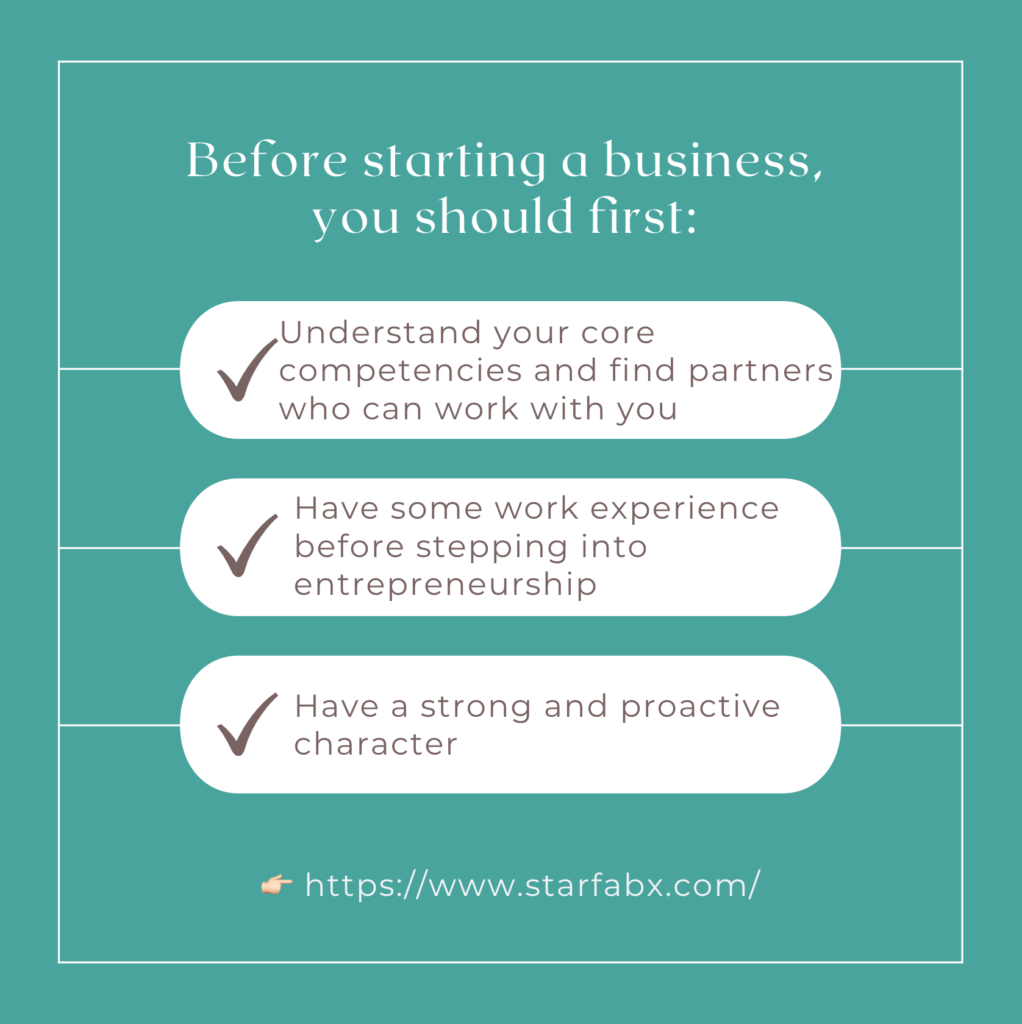【StarFab Newsletter Issue 2】What You Need to Know Before Starting a Business in Tech!
For those looking to pursue the entrepreneurial path and chase dreams, this one is for you. Through interviewing our StarFab founders Amanda and Jack’s years of experience, we hope to give you valuable advice and tips in starting your own business. What should you focus on, and what misconceptions should you avoid throughout your entrepreneurial journey? Here is an interview you won’t want to miss!
What advice do you have for someone who is looking into starting their own business? Particularly, advice to students and young entrepreneurs. What do you recommend when they are taking their first step?

1. Understand your core competencies and find partners who can work with you
AMANDA:Never try to create a startup on your own because nobody can administer a startup’s growth and management simultaneously in such a multi-faceted venture. You need to find partners who are willing to work towards your vision with you.
It is critical to have a vision, and your vision shouldn’t be about making profits; instead, your vision should make an impact.
If you want to start a business, you need to think about your business’s vision. Does it make a difference that your company doesn’t exist today?
If not, you can choose to join an already-established company and be a part of a cause. Join them, work hard, and achieve the vision faster. Perhaps when you are working there, you will discover what the market is lacking or needs improvement. Then, with your experiences, determine the market opportunities, utilize effective resources, and create your own product or service afterward.
However, if your current core competence can already fill a void in what the world lacks, then go for it! This can propel you to achieve your goals with passion and persevere whatever challenges in front of you.
It is extremely important for you to have a passion for creating a startup because that will fuel you to overcome challenges on your journey. Otherwise, even if the team has the most extraordinary talents, many startups end up having internal conflicts and forget about trying their best to overcome difficulties.
2. Have some work experience before stepping into entrepreneurship
JACK:Sometimes, my colleagues or peers will share their ideas and business opportunities with me and say that they want to start their own business. However, after chatting with them, I often recommend them to think carefully. Too many people fantasize about the idea of entrepreneurship.
For example, this applies especially to the tech startup ecosystem. The threshold to competing and surviving in the industry is very high. Unless you are a genius or have cutting-edge technology; otherwise the threshold to entering the market is very high. If you’ve never worked for an organization, you may lack the experience to have a broad, futuristic vision. What you see can be too narrow-minded, so upon completion, your project becomes a question of “then what?”
I highly recommend students or young entrepreneurs to gain more experience before trying to start their own business. You can recruit for a big corporation or join a startup you think has the potential to succeed. Don’t take on such a big responsibility of starting a business right from the start.
When you become an entrepreneur, you actually will not have much time to focus on the actual product or service because you will have so much on your plate! Besides, a lot of the responsibilities can’t be delegated to employees. If you have never experienced training from an established company or work experience, you may struggle to find your balance between product development and company management. As a matter of fact, a common reason that many new ventures end up failing is that they cannot effectively manage operations and corporate governance, not because they lack the technology.
3. Have a strong and proactive character
JACK:Besides being knowledgeable about industry trends, you also need to consider if your character fits being an entrepreneur. This is actually the most important. There are too many uncontrolled variables in starting a business; do you have the determination to handle all of it? Can you accept that your product may need to change as the market changes? Can you accept high labor turnover? There are too many things that you won’t be able to foresee.
I know how difficult it is to start a business successfully, and I’m only saying all of this because I’ve gone through a lot from my experience.
What are some industry trends you believe individuals outside of the tech industry should know more about?
AMANDA:This depends on your perspective.
It is better for people outside the industry to understand the technology’s application rather than its development. I recommend that they can start with those that they are interested in — for instance, 5G applications, self-driving cars, smart cities, …etc. Start from here, and then you can quickly understand how the technological development results are applied.
If you want to seize business opportunities as an investor, you can start with understanding the technology’s finances. This applies to all technology. Investors care about: What product or service is the company developing? Which areas of application are you focusing on? What is the market size? Where is the main market? , What is the realizable market share? What are the revenue and profitability? All these investment evaluations can be done by looking at a company’s publicly issued information.
JACK:We have observed that startups should pay more attention to the changes in industry trends over the past few years.
A change can completely disrupt the operations of a startup. For example, after Google launched its image recognition system, pretty much every startups’ efforts went in vain. What do you do when a big corporation, which has significantly more image data and resources, launches the same service that you are developing? If you are not aware of market trends, all of your past efforts will go in vain. As a startup, your greatest value lies in innovation, and keep in mind that no product or service can always be in the same market position. Startups need to be sensitive and alert to changes in the industry at all times.
In the tech startup space, what are some industry trends that people overly focus on?

1. Application of the technology
AMANDA:Don’t always talk about technology; instead, we should be talking about the technology’s application.
Countless startups focus on marketing the research and development aspect of their technology, but it’s actually more important to try and sell the profitability of the technology! Elaborating on the greatness of the technology or the number of patents issued only highlights the expenditure of the technology, which startups shouldn’t persist on marketing these aspects. Alternatively, go ahead and explore “how to profit,” particularly “how to profit in the market.”
2. Doing the right thing at the right time
JACK:Startups need different resources at different stages, and doing the right thing at the right time is the most important thing to keep in mind.
Some startups focus too much on getting investments, while others overly focus on gaining exposure. Startup ventures need a lot of resources to succeed. Still, taking premature exposure, for example, it is perilous for startups to reveal their product/ service before they are even ready to sell it. As you show your unfinished product to the public, you reveal the business opportunity you spotted to the world. By then, how do you make sure that you will be able to complete it before anyone else does?
How have accelerators helped startups survive crises?
AMANDA:Startups need to keep in mind what type of advising they need when they are looking for accelerators and counseling agencies to work with. What exactly is the aspect they lack at their current stage? Is it an investment, business pipeline extension, business model verification, management, reputation, or technical development support? These need to be defined already for startups to choose their accelerators wisely as accelerators have their uniqueness in helping startups. Each accelerator has different resources, domain knowledge, and ecosystems that differ from industries as well, and startups should look for the accelerators that can genuinely help them.
JACK:Under accelerators’ guidance, the entire team can spot new business opportunities together, which can help startups with potential.
StarFab has many success stories where startups were already close to insolvency, but through accelerators, they re-explored what is suitable for their product development and found their market value. Eventually, they were able to make a business turnaround with their entrepreneurial spirit and StarFab’s advising!
